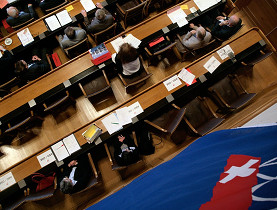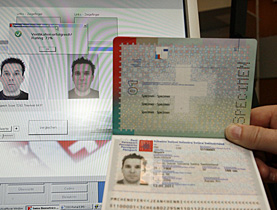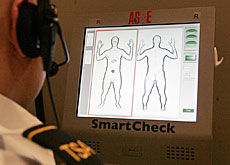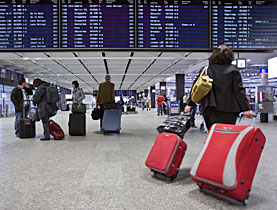New passport wins expats’ stamp of approval

Swiss expatriates have clearly come out in favour of introducing passports equipped with an electronic chip containing biometric data.
Voters will have the final say on May 17 in a ballot forced by a coalition of centre-left and rightwing politicians who are challenging a decision by parliament.
The decision by the Council of the Swiss Abroad is in line with the government, the main centre-right parties and the business community.
Supporters of the biometric passport won the upper hand in a debate at an assembly meeting in the Swiss capital, Bern on Saturday. Forty-three delegates voted in favour with 16 against and three abstentions.
Thérèse Meyer-Kaelin, a parliamentarian for the Christian Democratic Party, said the new passports would make the Swiss travel documents more difficult to forge and ease travel.
The passport, to be issued in 2010, is a requirement of countries belonging to the single-border Schengen area in Europe.
“There are a number of safety measures to protect the databases and prevent abuses,” Meyer-Kaelin said.
She warned that failure to introduce the new passport could complicate relations between Switzerland and the European Union.
Tourism
She also said only holders of biometric passports would be able to travel to the United States without a visa.
Jürg Schmid of Switzerland Tourism added that a key economic sector would also suffer because Asian tourists visiting Europe would have to apply for a separate visa if they wished to enter Switzerland.
However, Social Democratic parliamentarian Carlo Sommaruga argued that Switzerland would have enough time to re-negotiate an accord with the EU.
“Switzerland has nothing to fear,” he told the assembly.
Private sphere
Sommaruga highlighted the data protection risks of a central register and pointed out that the government could even decide to equip identity cards with electronic chips at a later date.
“The private sphere has to be respected, citizens must not be treated like criminals,” he said.
Several speakers in the assembly warned of the increasing interference by the state through databases.
“They keep an ever closer eye on us,” warned a Swiss representative from South Africa.
No discrimination
Opponents also cautioned against higher costs for the new passport, because the authorities plan to reduce the number of application centres.
For their part, supporters warned a rejection of the biometric passport would restrict travel.
The assembly overwhelmingly approved a resolution calling on the authorities to ensure that the Swiss abroad will not be discriminated against if passports with electronic chips are introduced.
“We expect that every Swiss embassy and regular consulate is equipped with the technical means to record biometric data needed for the passports,” said Roberto Engeler, a senior member of the Swiss Abroad Council.
In a related development, Council President Jacques-Simon Eggly criticised the Swiss government for dragging its feet over calls in parliament to specify the political and economic importance of the Swiss Abroad.
swissinfo, Urs Geiser

More
Referendum
Swiss voters will decide on the introduction of electronic passports, including a central database with fingerprints.
A broad-based political coalition challenges the parliamentary decision to a referendum on May 17.
The main political parties are divided. The rightwing Swiss People’s Party and the centre-left Social Democrats and Greens have come out against.
The centre-right Radicals and Christian Democrats as well as the business community, including the travel and tourism sector, are in favour.
676,176 Swiss lived abroad in 2008, mainly in Europe (418,000) and North America (118,000).
More than 70% of the Swiss abroad have dual nationality.
Of the 124,399 expatriates – aged over 18 –just under 24% have registered to vote.
Biometrics is the science of measuring an individual’s physical properties.
Biometric systems recognise features such as a fingerprint, iris patterns, ear shape, and vein structure.
A person’s biometric data can be compared with the information contained in the passport for verification purposes.

In compliance with the JTI standards
More: SWI swissinfo.ch certified by the Journalism Trust Initiative




You can find an overview of ongoing debates with our journalists here. Please join us!
If you want to start a conversation about a topic raised in this article or want to report factual errors, email us at english@swissinfo.ch.